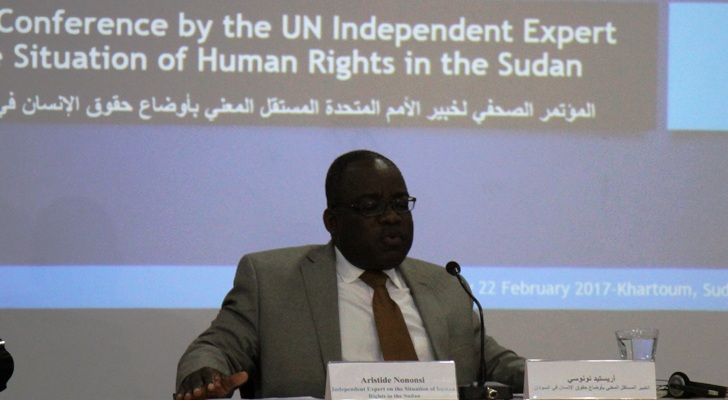UN expert says concerned over detentions and press freedom in Sudan

May 21, 2017 (KHARTOUM) – The United Nations independent expert on the situation of human rights in the Sudan, Aristide Nononsi Sunday has expressed concern over detentions of civil society activists and continued the crackdown on the press and religious minorities.
The UN expert is visiting Sudan from 11-21 May to carry out his fourth mission to the country so as to continue his engagement with the Sudanese authorities and discuss the implementation of his recommendations
In a press release held at the end of his visit in Sunday, Nononsi said he is still “concerned about a number of human rights issues in the country that have not been dealt with very much”, adding “I am aware of incidents that appear to be harassment and arrests targeting representatives of civil society organizations.”
“I’d like to urge the Sudanese authorities to release Dr Mudawi Ibrahim and Hafez Idris, whom I believe have been held solely for legitimate actions to protect and promote human rights in Sudan,” he added
Ibrahim, university professor and Chair of the non-governmental organisation Sudan Social Development Organisation (SUDO) was arrested on 7 December 2016 by the National Intelligence and Security Services (NISS).
Nononsi pointed out that the suspension of Al-Jareeda newspaper in December 2016 by the NISS contradicts the interim national constitution and the International Covenant on Civil and Political Rights ratified by Sudan, saying “I raised this issue with the Sudanese authorities.”
The UN expert added that he urged the authorities to make the necessary amendments to the Voluntary and Human Work Organization Act of 2006 to bring it into line with the constitution and international human rights standards and to repeal all provisions of this law that adversely affect the work of civil society organizations and allow civil society actors to carry out their activities in an open, safe and sound environment.
He stressed the need to ensure the protection of freedom of religion, saying “I refer here to the destruction of churches and places of worship by the NISS, which was also used to intimidate, detain and arrest Christian religious leaders.”
He pointed out that he discussed this issue with government officials, describing it as “legitimate concerns” that the Sudanese government should address them, given the importance of freedom of religion in any democratic society.
Earlier this month, Khartoum State authorities demolished a church in Soba Al-Aradi suburb, 19 km from Khartoum, despite pledges by Sudanese government officials to stop Churches’ demolition.
Sudanese authorities earlier this year delayed a plan to demolish some 27 churches including Soba Al Aradi church, pointing they are not officially recognised as churches.
However, church leaders say the authorities refuse to give them building permits when they submit an application for the construction of a church. They stress this situation force them to resort to these houses of prayer in the far suburbs of Khartoum.
Nononsi noted that the unilateral cease-fire from government and armed movements in Darfur is largely holding, but pointed to “continuing threats of violence and attacks against civilians in other forms, including inter-communal violence, sexual violence and the abduction of civilians.”
He called on the government to focus on implementing provisions of the Doha Document for Peace in Darfur (DDPD) pertaining to dissolution and disarmament of militias so that protection issues can be addressed in the region.
The UN expert pointed to some positive developments made by the Sudanese government in the human rights file compared to his previous visit in February, welcoming the decision of the Sudanese President Omer al-Bashir issued on March 8 granting amnesty to 259 members of armed movements who were captured during the fighting with government forces in Darfur.
He also praised al-Bashir’s decision to appoint the head of the National Human Rights Commission (NHRC) on May 16, stressing the importance of the role that an independent national human rights institution can play.
Nononsi appealed to the Sudanese authorities to fill the remaining vacant posts of the commissioners in a transparent and representative manner and to support national human rights institutions with the necessary funding to enable them to carry out their functions effectively.
He further thanked the Sudanese government for its cooperation and for giving him access to all the places, persons and institutions to which he requested to meet.
The independent expert is expected to present his findings and recommendations to the U.N Human Rights Council in September 2017.
(ST)
